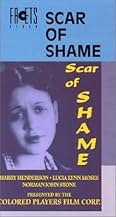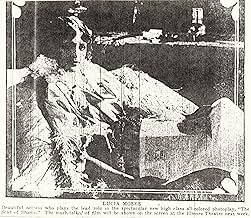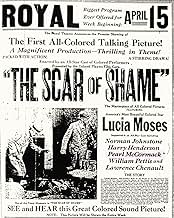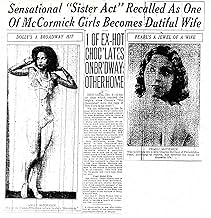A black musician marries a woman facing abuse from her stepfather to rescue her. After the marriage, he refuses to introduce her to his mother, fearing his mother's disapproval of her lower ... Read allA black musician marries a woman facing abuse from her stepfather to rescue her. After the marriage, he refuses to introduce her to his mother, fearing his mother's disapproval of her lower socioeconomic status.A black musician marries a woman facing abuse from her stepfather to rescue her. After the marriage, he refuses to introduce her to his mother, fearing his mother's disapproval of her lower socioeconomic status.
- Awards
- 1 nomination total
Charles Gilpin
- Lido Club Gambler
- (uncredited)
Shingzie Howard
- Louise's Maid
- (uncredited)
- Director
- Writer
- All cast & crew
- Production, box office & more at IMDbPro
6.3506
1
2
3
4
5
6
7
8
9
10
Featured reviews
Pretty Good For It's Time
OK first of all let's face it. Some films during the silent era can be boring and painful to actually get into, but are more worth the watch for the visuals of what things were like back then. I personally like watching them because there aren't a crazy amount of them left and it is fun to fantasize what it would have been like back then. I always feel like there are not enough words to justify having words at all during the films. This film is a silent black film with a great story. It doesn't put you to sleep and it has some powerful silent acting along with a powerful story about class. (This movie is called a race film bc it was a film made for black people starring black people. It does not mean that this movie is about racial issues with other races, but about a couple who marries each other outside of their classes and how the female lead has a very difficult time adjusting to a higher class life.) It is definitely worth the watch. It is very sad how many very early films such as this did not make it through the years. Watch them and appreciate them.
Very Important Film
Scar of Shame, The (1927)
*** (out of 4)
Historically important race film (black cast for black crowds) is one of the best I've seen from this genre of films. A rich concert pianist (Harry Henderson) marries an abused poor girl (Lucia Lyn Moses) so that she can escape her abusive stepfather but this leads to tragedy as the girl doesn't know any life other than the ghetto. Sadly a lot of these silent race films are now lost but from the few I've seen I can see why they were controversial back when they were originally released. Like Within Our Gates, this film spends a lot of time bashing black people for their living conditions, alcohol and the "shame" of their race, which is interesting to see since this film was meant for a black crowd. I guess the producers knew black folks would be seeing these films so they wanted to push some sort of moral issue on them. What I also find interesting and somewhat hypocritical is the fact that these race films always put light skinned black people in the lead roles. In fact, if you just looked at the actors in this movie you'd never guess they were black and in several scenes it appears that the actors are wearing make up to make themselves look lighter. I've read a couple books by race experts and they said this was due to the producers hoping these films could sneak into white theaters (they never did).
As for the film itself, it's pretty much a remake of Griffith's Broken Blossoms bit it's still very powerful and memorable. The best thing about the movie are the performances, which match any of the actors appearing in Hollywood films at the time. The real highlight is the work of Lucia Lynn Moses, who while filming this was also working at The Cotton Club. She's an incredibly beautiful woman who uses those looks to bring out a certain sadness, which would touch anyone. She's does a remarkable job here and it's a damn shame that this was her only film. The film's final act is pretty predictable and far fetched but it still works pretty well. At times the film pushes its moral lessons a tad bit too strongly but this is still an important film that more people need to see.
*** (out of 4)
Historically important race film (black cast for black crowds) is one of the best I've seen from this genre of films. A rich concert pianist (Harry Henderson) marries an abused poor girl (Lucia Lyn Moses) so that she can escape her abusive stepfather but this leads to tragedy as the girl doesn't know any life other than the ghetto. Sadly a lot of these silent race films are now lost but from the few I've seen I can see why they were controversial back when they were originally released. Like Within Our Gates, this film spends a lot of time bashing black people for their living conditions, alcohol and the "shame" of their race, which is interesting to see since this film was meant for a black crowd. I guess the producers knew black folks would be seeing these films so they wanted to push some sort of moral issue on them. What I also find interesting and somewhat hypocritical is the fact that these race films always put light skinned black people in the lead roles. In fact, if you just looked at the actors in this movie you'd never guess they were black and in several scenes it appears that the actors are wearing make up to make themselves look lighter. I've read a couple books by race experts and they said this was due to the producers hoping these films could sneak into white theaters (they never did).
As for the film itself, it's pretty much a remake of Griffith's Broken Blossoms bit it's still very powerful and memorable. The best thing about the movie are the performances, which match any of the actors appearing in Hollywood films at the time. The real highlight is the work of Lucia Lynn Moses, who while filming this was also working at The Cotton Club. She's an incredibly beautiful woman who uses those looks to bring out a certain sadness, which would touch anyone. She's does a remarkable job here and it's a damn shame that this was her only film. The film's final act is pretty predictable and far fetched but it still works pretty well. At times the film pushes its moral lessons a tad bit too strongly but this is still an important film that more people need to see.
An effective tragedy that demonstrates the importance of environment in shaping the lives of people.
I enjoyed this race movie intended for black audiences, even though I am not African-American or any racial minority. The forward states its point of view that a poor environment for a child will inevitably bring on a sense of shame, and then proceeds to unfold its story of an educated man in the field of music marrying a lower class woman to protect her from her stepfather, who beats her. Problems arise, however, when he won't take her to see his mother, who doesn't know he got married, and who he knows will be disappointed he did not marry a girl from his own class. My only problem with the movie was in the casting of the very refined Lucia Lynn Moses as the woman, so I could not fathom why her husband, well played by Harry Henderson, would not want his mother to meet her. It's an old-fashioned movie with some old-fashioned ideas, but has a few twists and wound up producing a few tears in my eyes. Watch it with some hankies close by if you are a softy for such movies, like me.
7tavm
The Scar of Shame was an interestingly good silent "race movie" drama
Since it's once again Black History Month, I thought I'd once again review various movies made by people of color for the occasion. This production of the Colored Players Film Corporation (which was co-founded by one African-American, Sherman H. Dudley, a former stage performer) was quite compelling as a cautionary drama though the melodramatic trappings do permeate. Still, there were quite some good performances by the cast of which one of them, a Lucia Lynn Moses, was quite alluring in going from a victimized girl to one trying to be more seductive. It's interesting finding out on this site she filmed this in Philadelphia while also commuting to New York as a chorus girl at the Cotton Club. I don't feel like revealing much else so on that note, I recommend The Scar of Shame.
A Naturalistic Melodrama with Fine Performances
THE SCAR OF SHAME (1927) is one of the few surviving movies from the silent era to feature an all black cast. It tells the story of Alvin Hillyard, an educated musician from the black upper class, and Louise Howard, a woman from "the other side of the tracks". When her drunken father starts to beat her, Alvin, who is staying at a nearby boarding house, intervenes and brings her to the house so that she may escape from her father's clutches. The two eventually fall in love and marry, but their differences in station complicate their lives in a way that neither would have imagined
.
SCRIPT: THE SCAR OF SHAME has a premise worthy of exploration – the differences in social classes among blacks – that would never have been attempted in mainstream Hollywood movies at the time. It also proposes that the environment in which one is raised unalterably shapes one's future, an idea that was explored in the naturalistic novels of authors such as Stephen Crane and Frank Norris. Unfortunately, the narrative starts to sag in the middle of the movie, and relies on melodramatic plot turns at times. Louise in particular does things that seem to have no motivation either emotionally or rationally. This causes the film to lose its way somewhat and stops the movie from exploring the its theme more successfully. The assertion is that Louise's strange behavior is due to her inability to overcome her environment, but it's not made entirely clear in the exposition. Still, the movie's screenplay does have considerable virtues. Instead of completely villainizing Louise's father, the writers attempt to balance his character out with regret over his treatment of her, and you can see his struggle to overcome his weakness. Alvin Hillyard is presented as a sympathetic character that wants to do what is right. The movie also scores points for not portraying any characters as buffoons, an all-too-common tendency at that time. SCORE: 7/10
ACTING: The acting is generally quite restrained and believable. The two leads, Harry Henderson and Lucia Lynn Moses, show ease before the camera and contribute solid performances that are scaled for the intimacy of the camera. The ensemble cast plays effectively in an understated manner, generally avoiding the mugging and melodramatics that could occur frequently during the silent era. Pearl McCormack is particularly effective as Alice Hathaway, a young woman with whom Hillyard falls in love years after the breakup of his marriage to Louise. William Pettus also does fine work in his portrayal of Louise's father, with a finely balanced performance that shows his character as a flawed human being instead of a mere monster. SCORE: 9/10
CINEMATOGRAPHY/PRODUCTION: The camera-work is solid and the editing is well done (there was one slight repetition of frames early on). The director, Frank Perugini, and the cameraman, Al Liguori, show a good command of the use of silent film as a visual storytelling medium. There are some interesting touches here and there that contribute to the narrative – specifically the use of a baby doll to show the couple's hopes and aspirations at first, and then the way their relationship deteriorates later. There is also some interesting cross cutting during a climactic scene. Some scenes are a bit static but not too lengthy. SCORE: 8/10
SUMMARY: THE SCAR OF SHAME tackles an issue that mainstream films would never have touched at the time of its release. In spite of the flaws of its narrative and characterizations, the actors do uniformly fine work in their portrayals. The movie is competently filmed and produced with occasional outstanding moments of visual interest. The film does deserve commendation for its portrayal of the complexities of life within the black community of the early 20th century. SCORE: 8/10
SCRIPT: THE SCAR OF SHAME has a premise worthy of exploration – the differences in social classes among blacks – that would never have been attempted in mainstream Hollywood movies at the time. It also proposes that the environment in which one is raised unalterably shapes one's future, an idea that was explored in the naturalistic novels of authors such as Stephen Crane and Frank Norris. Unfortunately, the narrative starts to sag in the middle of the movie, and relies on melodramatic plot turns at times. Louise in particular does things that seem to have no motivation either emotionally or rationally. This causes the film to lose its way somewhat and stops the movie from exploring the its theme more successfully. The assertion is that Louise's strange behavior is due to her inability to overcome her environment, but it's not made entirely clear in the exposition. Still, the movie's screenplay does have considerable virtues. Instead of completely villainizing Louise's father, the writers attempt to balance his character out with regret over his treatment of her, and you can see his struggle to overcome his weakness. Alvin Hillyard is presented as a sympathetic character that wants to do what is right. The movie also scores points for not portraying any characters as buffoons, an all-too-common tendency at that time. SCORE: 7/10
ACTING: The acting is generally quite restrained and believable. The two leads, Harry Henderson and Lucia Lynn Moses, show ease before the camera and contribute solid performances that are scaled for the intimacy of the camera. The ensemble cast plays effectively in an understated manner, generally avoiding the mugging and melodramatics that could occur frequently during the silent era. Pearl McCormack is particularly effective as Alice Hathaway, a young woman with whom Hillyard falls in love years after the breakup of his marriage to Louise. William Pettus also does fine work in his portrayal of Louise's father, with a finely balanced performance that shows his character as a flawed human being instead of a mere monster. SCORE: 9/10
CINEMATOGRAPHY/PRODUCTION: The camera-work is solid and the editing is well done (there was one slight repetition of frames early on). The director, Frank Perugini, and the cameraman, Al Liguori, show a good command of the use of silent film as a visual storytelling medium. There are some interesting touches here and there that contribute to the narrative – specifically the use of a baby doll to show the couple's hopes and aspirations at first, and then the way their relationship deteriorates later. There is also some interesting cross cutting during a climactic scene. Some scenes are a bit static but not too lengthy. SCORE: 8/10
SUMMARY: THE SCAR OF SHAME tackles an issue that mainstream films would never have touched at the time of its release. In spite of the flaws of its narrative and characterizations, the actors do uniformly fine work in their portrayals. The movie is competently filmed and produced with occasional outstanding moments of visual interest. The film does deserve commendation for its portrayal of the complexities of life within the black community of the early 20th century. SCORE: 8/10
Did you know
- TriviaFilm scholar Donald Bogle called this movie quite possibly the best independent black film of the silent era.
- GoofsAfter Alvin leaves his mother's house, the butler reaches down to pick up the dropped key with his left hand, the next shot is a closeup of him picking up the key with his right hand. The next shot he is standing up with the key in his left hand.
- Quotes
Title Card: One half the world doesn't know how the other half lives.
- Alternate versionsThe Library of Congress Video Collection has a restored version of this film with a new piano score composed and performed by Philip Carli. Its running time is 76 minutes. A small missing section is summarized by an intertitle. Other restoration credits: Simmon, Scott ....... restoration producer Fleming, Dina T. .... restoration production co-ordinator McConnell, Allan .... restoration magnetic recording laboratory head Winther, James ...... restoration videotape transfer and editor Chrisman, Paul ...... restoration music recordist DeAnna, Gene ........ restoration titles
- ConnectionsFeatured in American Experience: Midnight Ramble (1994)
Details
- Runtime
- 1h 8m(68 min)
- Color
- Sound mix
- Aspect ratio
- 1.33 : 1
Contribute to this page
Suggest an edit or add missing content




















